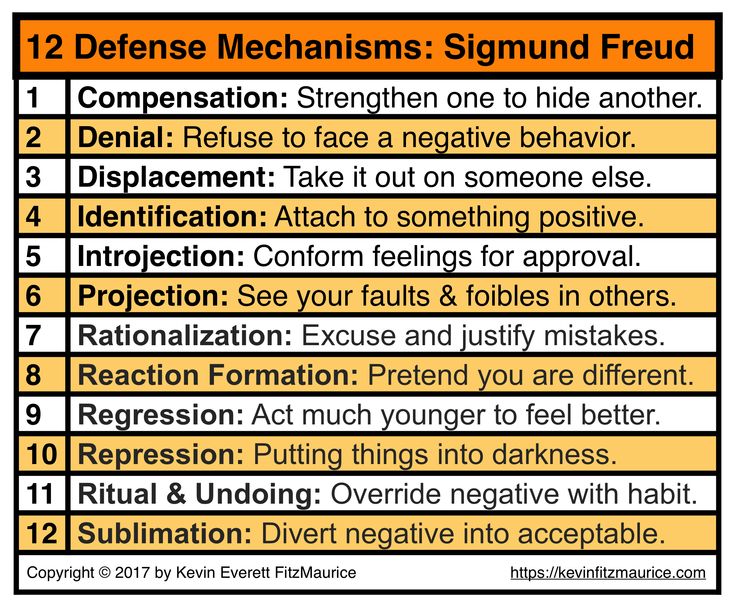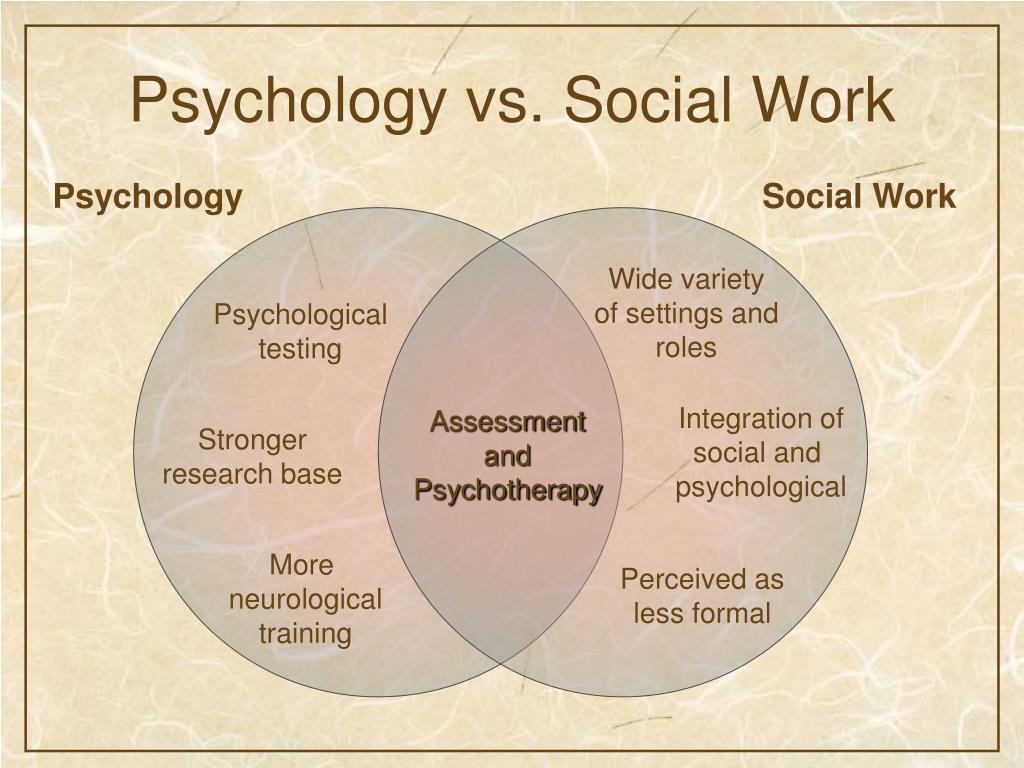Psychology defense mechanism projection
What Is Defensive Projection And How Do You Overcome It?
defense mechanisms Nov 17, 2021
Projection is a psychological defense mechanism where someone avoids recognizing their unacceptable impulses and traits by projecting them onto another person.
In relationships, projection can be harmful because it creates a great deal of confusion and misunderstanding between partners.
An example of projection is when someone bullies someone else because they believe they are weak for expressing their emotion when the bully themselves feels weak for feeling strong emotions.
Projection can be overcome with understanding and awareness.
Where Does Projection Come From?The concept of projection was first described by Sigmund Freud.
He argued that the unconscious mind often projects its own unacceptable qualities onto others.
Freud believed that this process occurred when we recognize our own unacceptable qualities in someone else. This can happen because we are unable to accept ourselves for what we really are.
This is called self-deception. Self-deception occurs when we deceive ourselves into thinking something is true about ourselves when it isn't.
How Does Projection Develop?Projection is based on the either/or notion that things are either good or bad. When someone believes this they internalize this feeling and as a result, reject certain parts of themselves they consider "bad".
Projection is often used as a way to protect one's self-esteem when a person feels that they have bad feelings, characteristics, habits, or impulses that they cannot accept as part of themselves.
Examples of Projection- A wife believes her partner will cheat on her when in fact the wife is having thoughts about cheating on her husband with a man she works with.
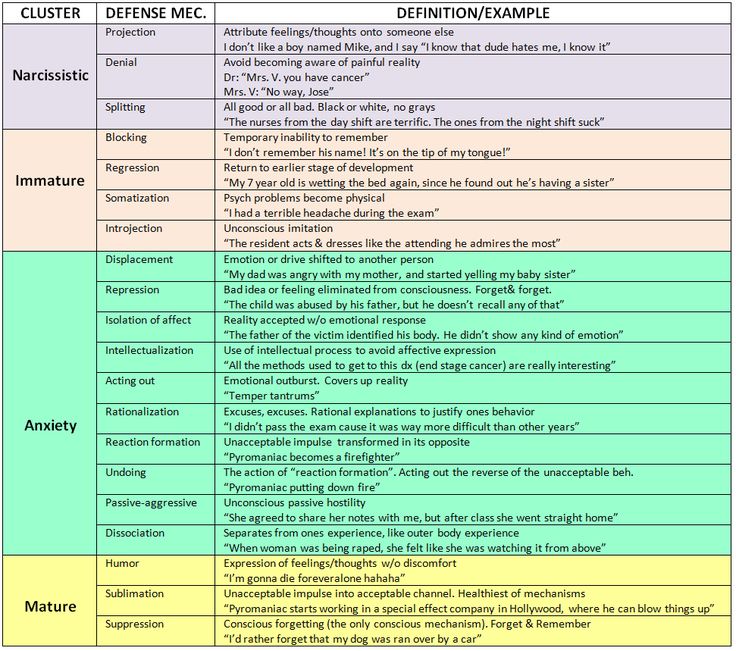
- A man feels insecure in his masculinity so makes fun of other men who demonstrate feminine traits.
- A woman criticizes her partner for interrupting her while she's talking when she regularly interrupts her partner.
- A man feels like his coworkers hate him when he is often judgmental and critical of his coworkers.
- A husband accuses his wife of hiding her financial purchases when he's been hiding his gambling losses.
- A woman feels as though her partner is only in their relationship because of the inheritance she will get when her parents pass when one of the reasons she married her partner was because of his earning potential and financial security.
- A man criticizes his wife for being irresponsible with money all the while he makes high-risk investment decisions that haven't paid out.
- Someone feels as though they want to make a lot of money but they feel bad about it so they say that other people who want to make a lot of money are greedy and selfish.
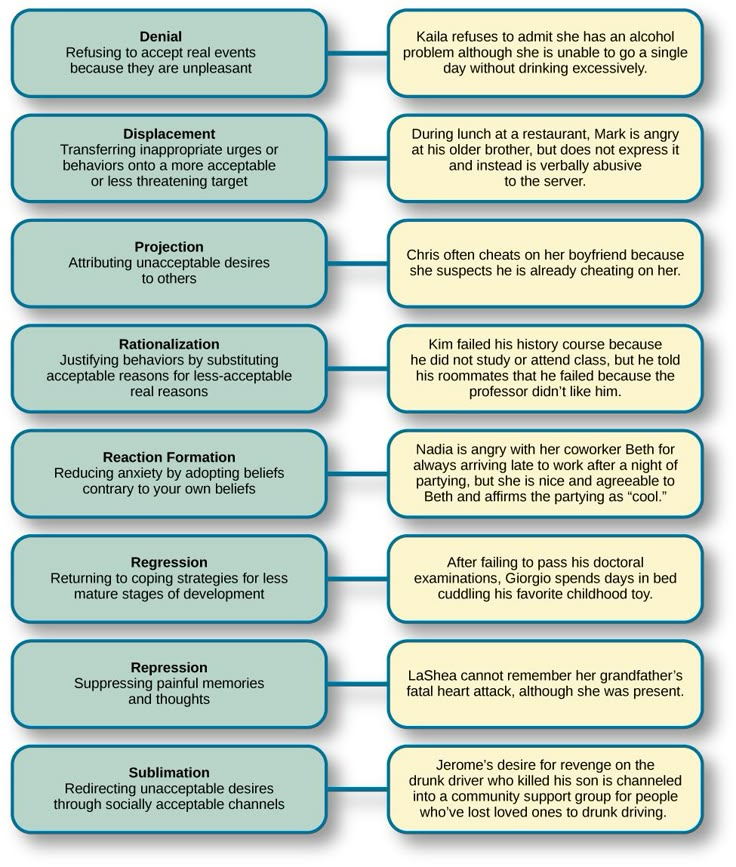
When you project your negative emotions, thoughts, or behaviors onto someone else, you feel justified in blaming them for having those traits or behaviors. You also feel justified in rejecting them because you think they deserve to suffer from those traits or behaviors.
Projection allows you to feel morally superior to the other person and helps you feel better about yourself.
Projection can be helpful when used in the short term, just like many defense mechanisms.
People can better cope with their fears, anxieties, and overwhelm when they deny uncomfortable truths about themselves in the short term. This may allow them to maintain their self-esteem in situations where it would be catastrophic to experience low self-esteem.
For example, it may be adaptive for someone who is giving a speech to believe that "people just don't get what I'm talking about" during the speech rather than admit to themselves that "maybe I don't get this concept well enough to explain it to this audience".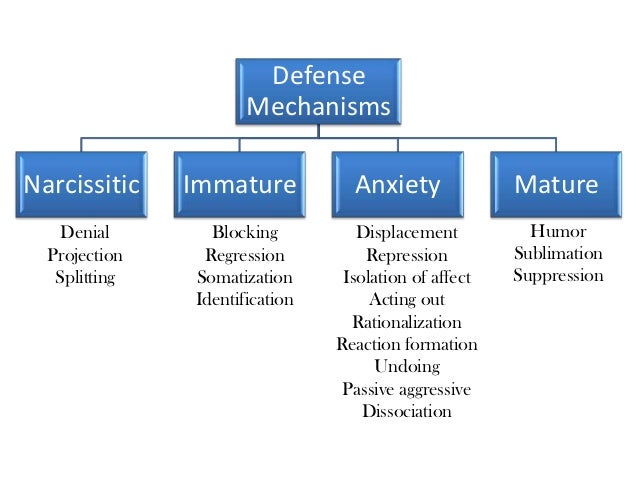 However, this point of view will not help the person in the long run because it will stop them from being able to improve their performance in the future.
However, this point of view will not help the person in the long run because it will stop them from being able to improve their performance in the future.
When used in the long-term projection can be destructive.
It can cause someone to feel as though the world is hostile and that they can't trust anyone.
It can be especially destructive to interpersonal relationships. It can lead to issues like victim-blaming, jealousy, and bullying.
Furthermore, projection can be the type of behavior you see in gaslighting, and so can be very destructive to relationships.
Impact of Defensive Projection on FinancesWhen used in regard to finances, defensive projection can be similarly helpful in the short term and harmful if used in the long term.
When used in the short term it may help you get through a short-term financial obstacle without losing faith in yourself.
For example, if you made a bad hiring choice in your business and are experiencing a dip financially in the short term it may be helpful to tell yourself that the person you hired was unqualified rather than admitting that you hired someone who didn't have the qualifications necessary to succeed at the job.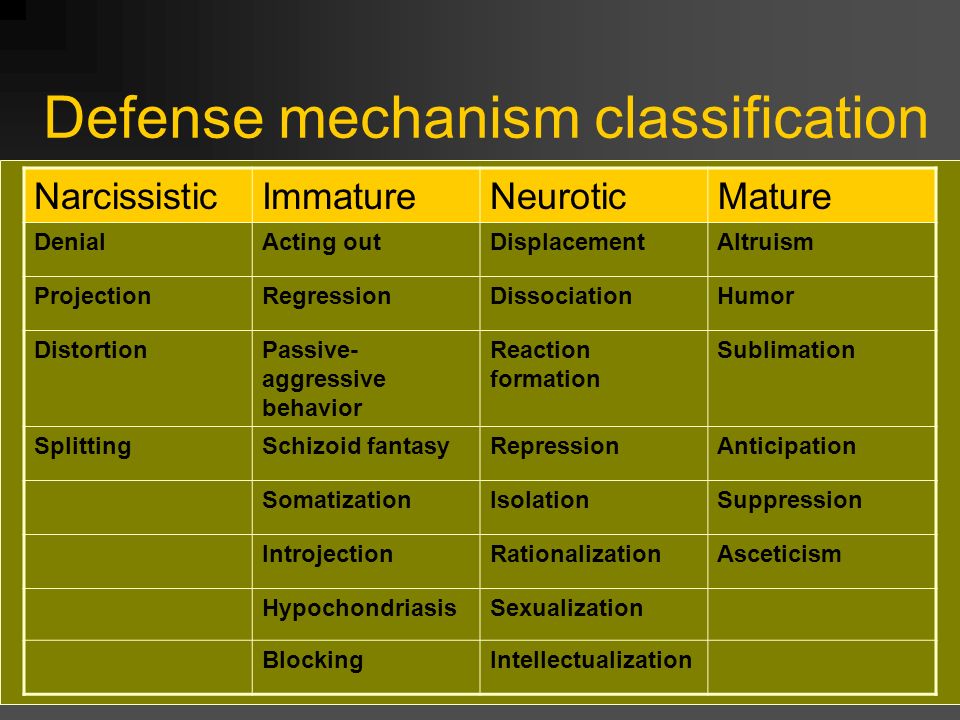 This will allow you to have the confidence to make your next hiring decision quickly and not get stuck in self-doubt.
This will allow you to have the confidence to make your next hiring decision quickly and not get stuck in self-doubt.
However, over the long term defensive projection can be harmful.
For example, if you keep making high-risk investment choices that are failing to provide a financial gain you may be tempted to tell yourself that the "market needs to correct itself" rather than addressing the fact that these high-risk investments are not working in your favor and you may need to adjust your investment strategy.
How to Overcome ProjectionRecognizing your own defensive projection is always the first step to overcoming it.
Be honest with yourself and what makes you feel insecure and anxious. Examine the impulses and traits that you have that you're accusing other people of having.
Evaluating Your Judgments
One technique that I've found particularly helpful is to have clients take note of their judgments of other people throughout the day.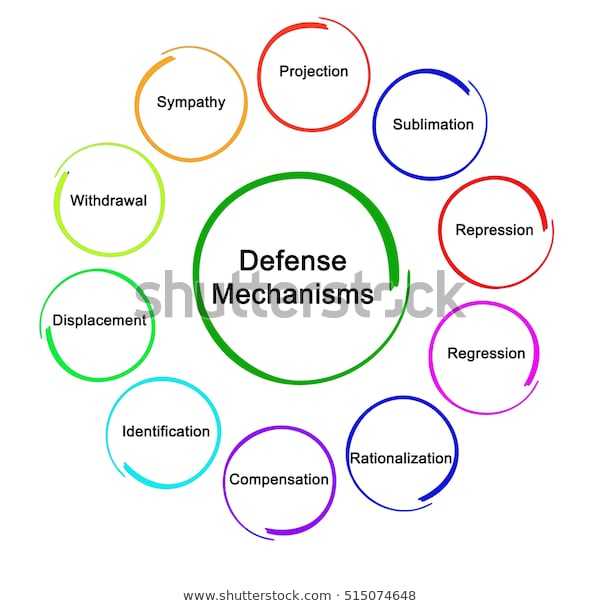
Then at the end of the day, I have them take some time to journal about how they may have those exact traits or behaviors they're judging other people for.
Often, when clients do this exercise they come to the realization that they are judging others for things that they themselves have but that they've judged as "bad".
When armed with this realization they're able to better understand themselves and realize that nothing is all good and all bad. Then they're able to choose new behaviors in the future.
The key to this process is to not judge yourself for the traits and behaviors that you may have been judging other people for.
It's important not to trigger feelings of shame and guilt when working through this process. This is why the assistance of a therapist or coach can be helpful in examining your defense mechanisms so you can come to accept parts of yourself that you may have found to be unacceptable in the past.
If you feel like you’re having difficulty with conflict in your relationship consider signing up to be one of the first to know about my new course, The Couples Guide to Financial Intimacy.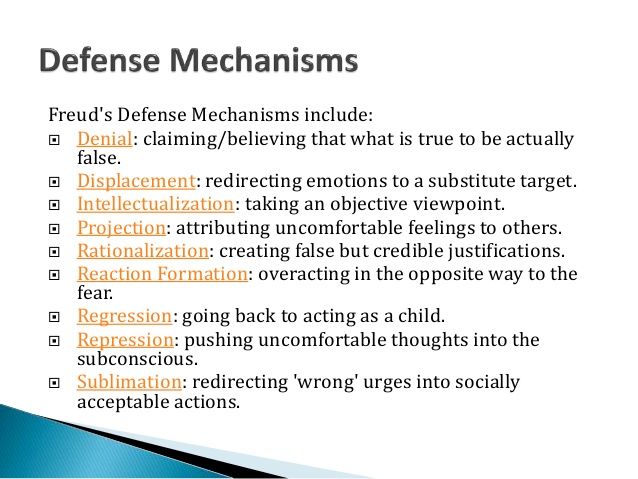 In it, you’ll learn how to understand your own and your partner’s behaviors and patterns better so that you can communicate well and have empathy for each other. This process allows couples to work as a team to create the financial reality they desire.
In it, you’ll learn how to understand your own and your partner’s behaviors and patterns better so that you can communicate well and have empathy for each other. This process allows couples to work as a team to create the financial reality they desire.
Is Projection the Most Powerful Defense Mechanism?
Source: George Rudy/Shutterstock
A computer is not really like us. It is a projection of a very small part of ourselves: that portion devoted to logic, order, rule, and clarity." —Ellen Ullman
Projection is a basic, self-protective defense, and a process which affects how people understand one another. When we project, we "put" part of ourselves onto other people, usually to "get rid of" something objectionable. It is as if we are throwing a part of ourselves outward and casting it, like the image from a movie projector, onto (really, into) the other person. It often plays out in relationship dysfunction, as the defensive activity bounces back and forth between us over time, operating beneath the radar without being addressed.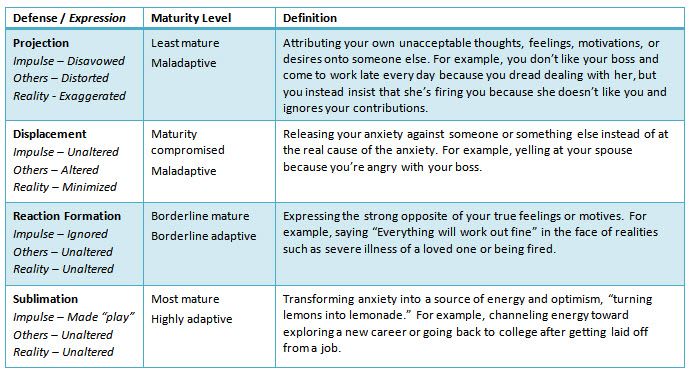
Projection and avoidance
Projection requires the "splitting-off" (dissociation, denial) of specific aspects of social reality, usually playing out the dynamic: "Whose fault is this? Not mine." There is a basic swap between what is about oneself, and what is about others, and this aspect of social decision-making is off. We treat the other person consistently with how we feel about that quality in ourselves. We are unaware of and/or avoiding something true about ourselves.
When we project, we end up treating others in ways that reflect how we could feel about ourselves if we weren't projecting (how we "really" feel about ourselves). For example, we can attack and attempt to destroy, we can idealize and worship, we can over-empathize, and so on, across the spectrum of human emotions and attributed motivations. It's complicated. And it is something which happens because of how the brain works, how the brain has evolved in culture, how the mind works, and how well we relate to one another. Since a relationship requires clear communication, distorting defenses can have a strong negative impact.
Since a relationship requires clear communication, distorting defenses can have a strong negative impact.
Energy is neither created nor destroyed
The first law of thermodynamics is the conservation of energy. Energy is neither created nor destroyed, and in a sense, the same is partially true for information. However, information can be degraded and lost. As an organ, the brain is unique in the human body, because it lives mainly in fantasy. In fact, the only direct contact the brain has with reality is arguably through interacting with itself via the senses. The senses take some kind of energy, patterned into information, from outside and transform it into a form which can be used internally, which is encoded in brain activity. Photons, for example, strike the back of the eye (which is made of layers of nerve cells that fire differently depending on the intensity and color of light). From that point on, perception is all about how the brain processes that information.
While the photons are absorbed into the retinal nerve cells, the information they carry is transformed into a pattern of brain activity, which eventually becomes conscious. However, we are aware of very little of what we see on a conscious level. Most of the info is either lost to noise or registers outside of awareness. Eventually, we communicate with others, but we can't communicate directly brain-to-brain, so there is another gap between people which information has to get through with sufficient fidelity to permit proper function.
Scripting the flipped
Social reality is constructed through a much more complex transformation of raw sensory data into minds, culture, and relationships, and much of what is going on never reaches us or only partially reaches us, in distorted and incomplete ways. Projection is a form of distortion in which information that is actually about oneself is incorrectly attributed to another person. There is a basic error in the construction of the interpersonal data, and what is about "me" is perceived as being about "you" or "her" or "them.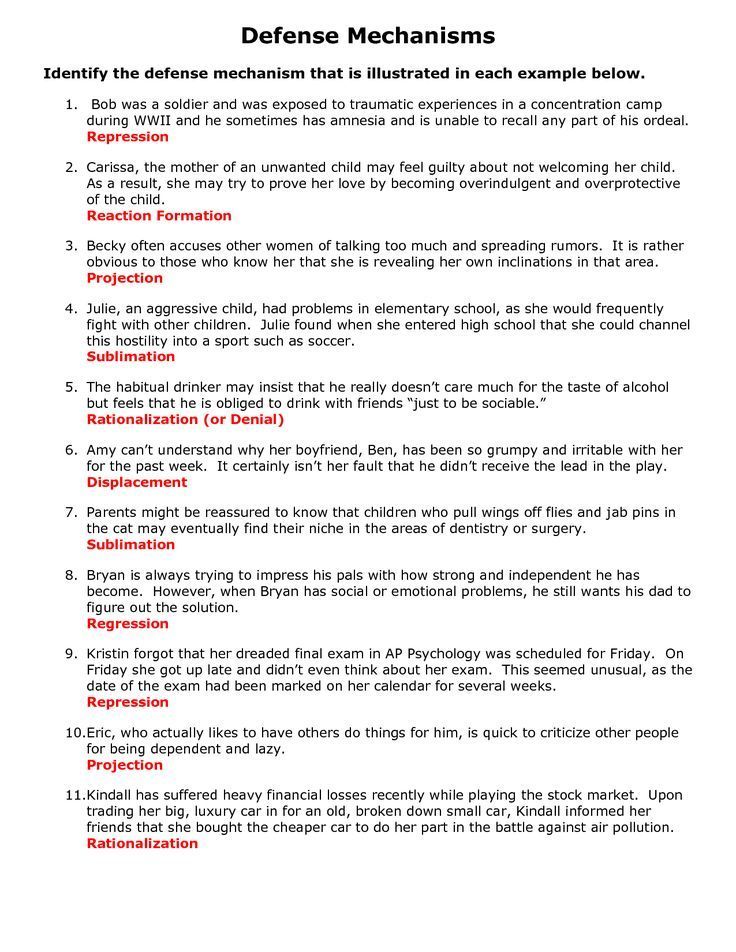 " The you-me script is flipped. Typically, this is viewed as a psychologically motivated defense to protect oneself from uncomfortable feelings, but sometimes it is just error, loss of data integrity. If we tried to pay attention to everything around us, it would overwhelm our bandwidth immediately.
" The you-me script is flipped. Typically, this is viewed as a psychologically motivated defense to protect oneself from uncomfortable feelings, but sometimes it is just error, loss of data integrity. If we tried to pay attention to everything around us, it would overwhelm our bandwidth immediately.
We need ways of selecting what information to notice, developing short-hand approaches to making sense of things. In a way, defenses are shortcuts to understanding what goes on with people and oneself psychologically, which serve important functions, but often lead us astray. When two or more people share a distorted view, however, there is no contradiction. As long as everything continues to work well enough, no one notices anything is off, and no one is asking any questions.
Talking about the brain this way may sound reductionist, a suggestion that everything boils down to brain activity, or even solipsistic. This is not what I mean to suggest, because what it says from my perspective is that we are permeable and irreducible intertwined with our environment, and those around us.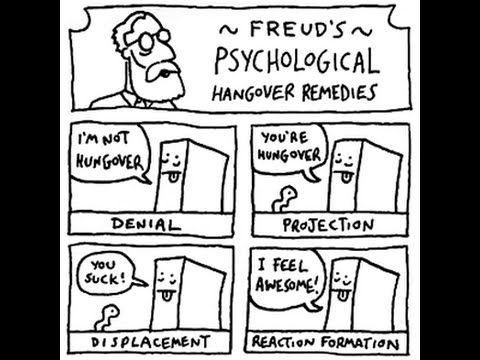 However, we are not always on the mark with others, and we often are misunderstanding ourselves, so we are always involved in a process of making adjustments in response to what we pick up.
However, we are not always on the mark with others, and we often are misunderstanding ourselves, so we are always involved in a process of making adjustments in response to what we pick up.
The work of play
The difference between inside and outside is less clear-cut when it comes to mental life than physical life. We can more easily mix up something within us for something outside of us, for the mind than the body. The least refined defenses, such as projection, are based on the widest gaps in shared understanding. We live in different worlds, but those worlds overlap more or less smoothly, depending on how well we communicate and relate.
In any case, other people can often tell when we are off-base, and we can often tell when others are mixing something up. If we can hear each other, we can help each other, but that typically doesn't work with projection, because the emotions underneath are raw, and there isn't a buffer. Projection is considered "primitive," because it is an easy defense to do, so it happens early in childhood development first.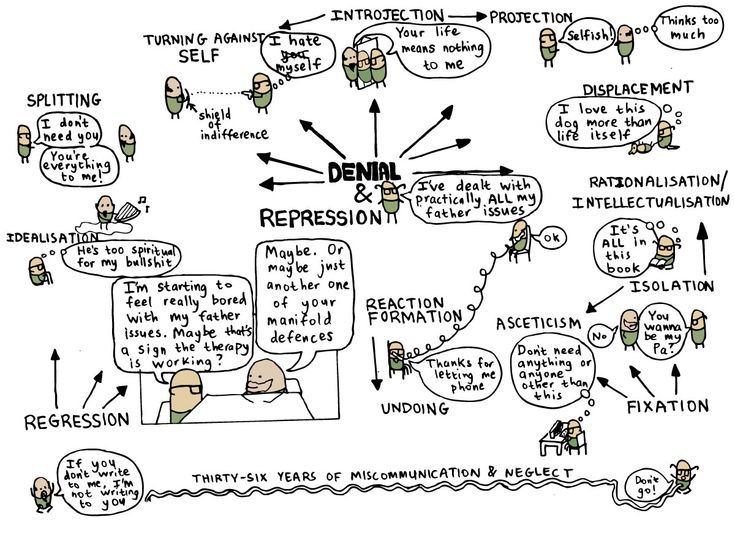
That is why when children project, we generally consider it normal, and if we are good-enough caregivers, we can play along with the reality presented in a way which fosters understanding. Confronting projection can be too violent when abrupt, when the other person doesn't have a back-up of emotional resilience, when they are not ready, when we don't communicate well for what they need, etc.
When grown-ups distort reality like that, they either have to hold tight to unconsciously feigned obliviousness or break. Projection is a rigid and sometimes fragile defense, so tread carefully. When we use projection, it makes it hard for us to properly interpret others' intentions, often leading to mistrust and discord. But projection also allows us to function in relation to others, at least until problems start to come up, by making difficult emotions tolerable. If we can play with reality, we can start to loosen up the rigidity of projective defenses, as long as that playfulness is not too much of a threat.
Please send me any questions, topics or themes you'd like me to possibly address in future blogs, via my PT bio page.
Projection as a defense mechanism of a personality, or why we see ourselves in others
Contact with the reality around us occurs every minute of our life, we report some information to the outside and receive it. When building relationships, or just communicating with other people, we are faced with the fact that we are forced to look for points of convergence of positions, views on things in order to reach an understanding of another person. This can be quite difficult. Ideally, the person himself is aware of the patterns that he has during communication. However, it often happens that we ourselves, without realizing it, meet not only with others, but also with ourselves, not who we actually are, but only a distorted projection of ourselves. nine0003
What is it about and what to do about it? To start. I propose to understand what a projection is in general, as a psychological defense mechanism of a person.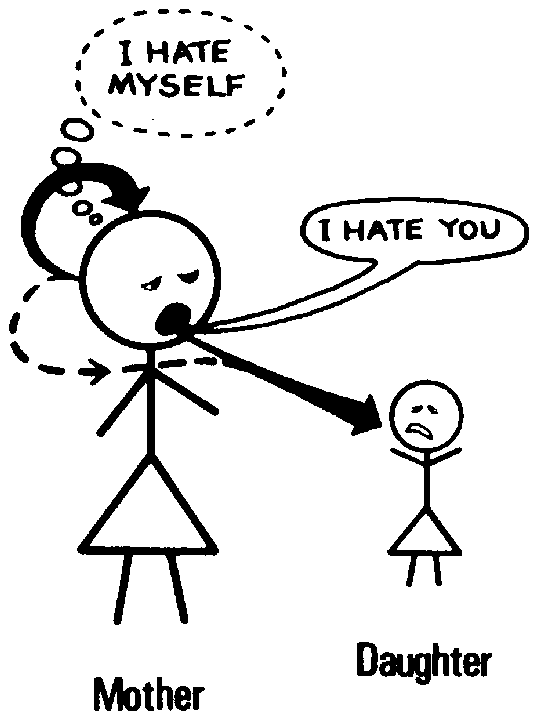
This article is addressed primarily to ordinary people who are far from professional psychology, but for whom it is important to save their face, to build contact with real people, and not with their own idea of them.
What is projection?
Projection can be understood as a mechanism when the psyche perceives its own qualities, properties, features, emotions as belonging to other people or processes. nine0003
Simply put, we often see what we have in ourselves in others, which causes certain emotions, most often negative ones. And we notice this and focus on these qualities precisely because it is in ourselves. We either do not accept it in ourselves, or it is in the mode of unprocessed psychological traumas.
It is easier for the psyche to take this “out of brackets”, not to appropriate it, because we often do not accept some qualities of our own personality in ourselves.
Related publications
An example of a projection from personal experience
I will give an example of my own projection, which I periodically monitor - violation of the psychological boundaries of other people.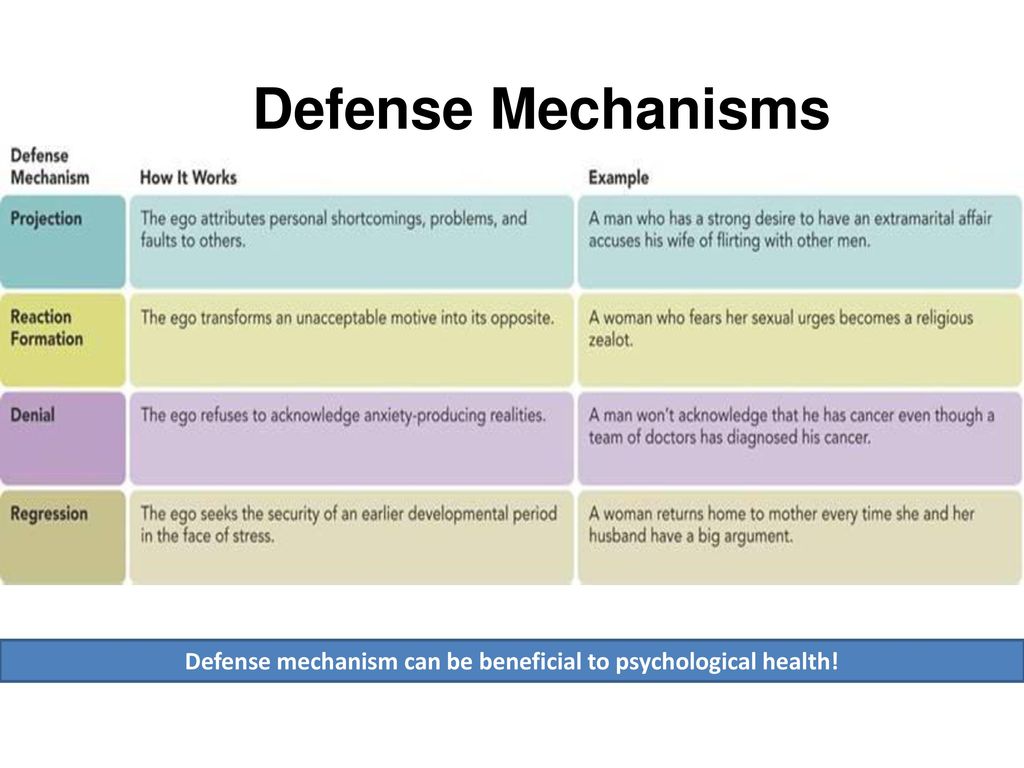 It looks like I can ask a person with whom I communicate closely an uncomfortable question, ask about something completely personal, give my opinion when I am not asked about it. As a result, when I encounter similar manifestations in other people, for example, a loud speech or squealing of a child, or too close contact on the subway, I feel annoyed. nine0003
It looks like I can ask a person with whom I communicate closely an uncomfortable question, ask about something completely personal, give my opinion when I am not asked about it. As a result, when I encounter similar manifestations in other people, for example, a loud speech or squealing of a child, or too close contact on the subway, I feel annoyed. nine0003
This can be called a “blind spot”, when it may be quite obvious for others, but not for the person himself, since he is included in this process and cannot make an objective assessment of what is happening.
Take responsibility for one's behavior and reactions
Of course, when a person himself understands the nature of his impulses, he is able to control them, but in most cases this does not happen, a person is "carried".
Taking responsibility for one's reactions and behavior is the mature attitude of a person who is responsible for himself and respects the people around him. The realization that in fact you yourself are the source of everything that happens around (in the case of the same boundaries) leads to building our behavior in such a way that we contact not with parts of ourselves, but with other people.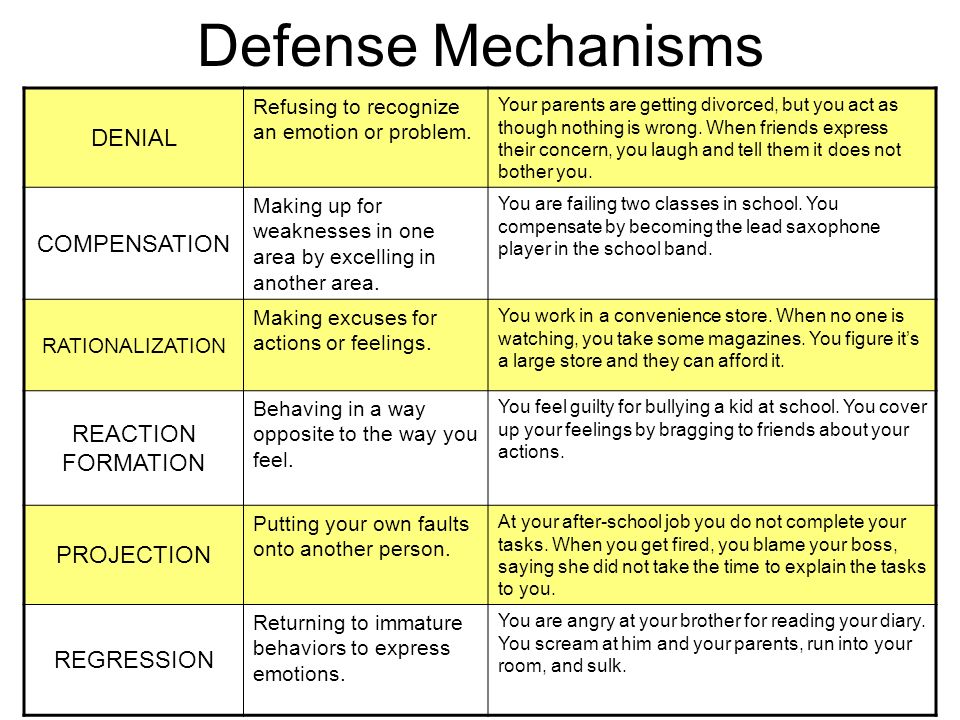 nine0003
nine0003
We build communication with ourselves
The fact is that when the psyche starts these mechanisms, a person is not in real contact with another person, but builds communication with himself (with his own subjective idea of another). And it is rather not only about what a person thinks or knows about it, but about the emotional sphere of the personality, which is difficult to control if it is not realized.
In this case, a person can sincerely believe that “his boundaries have been violated”, although he himself “intruded into someone else's territory”, not understanding this and blaming another person for this. nine0003
Moreover, attempts to “exterminate” what does not suit others in most cases lead to nothing, since the direction of the application of forces is the person himself, and it is necessary to deal with these qualities in oneself.
In trying to teach another person not to be late, you yourself must be aware that you are late yourself, or you have to be on time, but this does not suit you.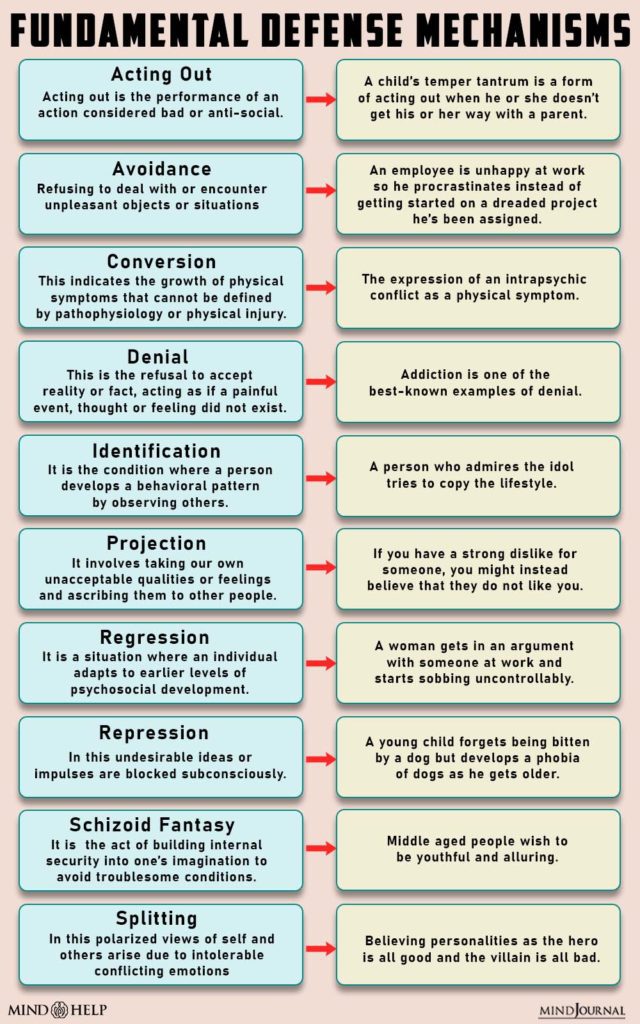 And in this case, your attempts to "re-educate the other" will be directed to yourself. And in most cases, you just discharge, "blow off steam", which makes it easier for you, and that's it. nine0003
And in this case, your attempts to "re-educate the other" will be directed to yourself. And in most cases, you just discharge, "blow off steam", which makes it easier for you, and that's it. nine0003
The reasons lie in our upbringing
Where do legs grow from? As a rule, the basis of projection is introjection, when we were brought up in such a way that “Don’t worry about it!”, “Be polite!”, But whether we ourselves want it or not, it doesn’t matter. There are rules of behavior in society, and if we do not accept them within ourselves, then when we see behavior that we cannot afford, we begin to feel annoyed with a person.
When we assume how another person sees the world or a situation, especially if we do not know him, then we rely on our personal idea of this, conscious or not. Therefore, in such situations, it is better to ask a person directly about something than to “think out” for him. nine0003
We tend to criticize other people for qualities or behaviors that we ourselves have.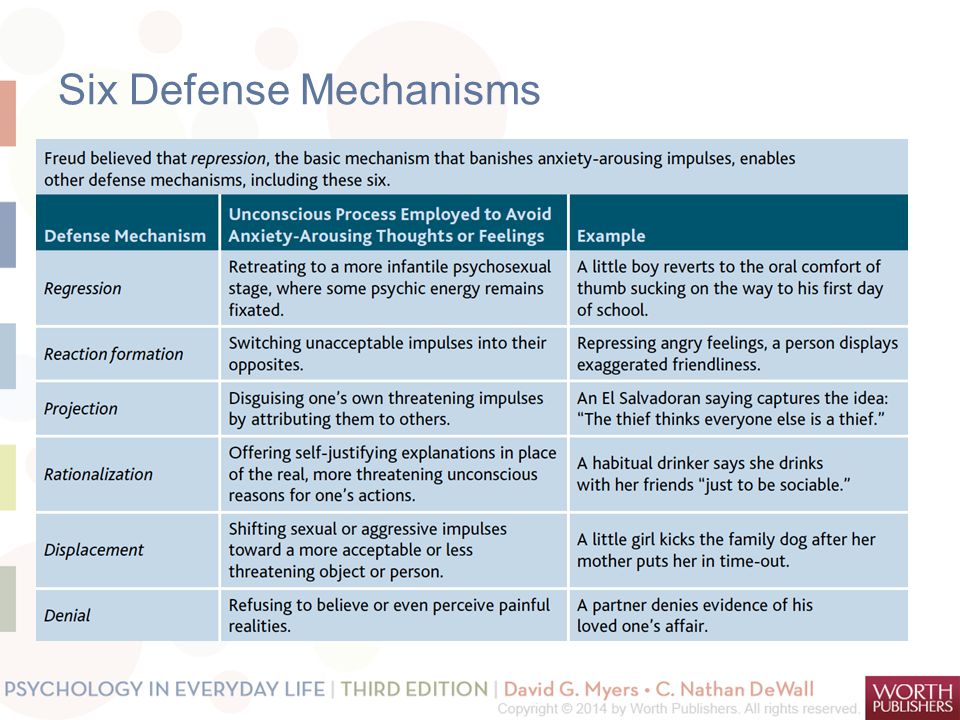 That is, we do not perceive the world and those around us directly, sensory, but replace this perception with a fantasy about it.
That is, we do not perceive the world and those around us directly, sensory, but replace this perception with a fantasy about it.
For example, if we see a secretive person, but we don’t allow ourselves to be like that in some situations, or vice versa, we ourselves are the same, however, we don’t accept this feature in ourselves, then we will “wind up” many reasons for such a person’s behavior, evaluate him, get angry, but we do not assume why he is behaving this way at a given moment in time. nine0003
This distortion of reality prevents direct contact with it. We build relationships with ourselves, believing that we are communicating with another person. In this case, any claims and grievances should be addressed to yourself, and not to another person.
Desires to "catch up and do good"
There are several indicators of this mechanism. For example.
A person, instead of saying: "I", as a rule, says: "We", or "They". There is no appropriation of one's own words.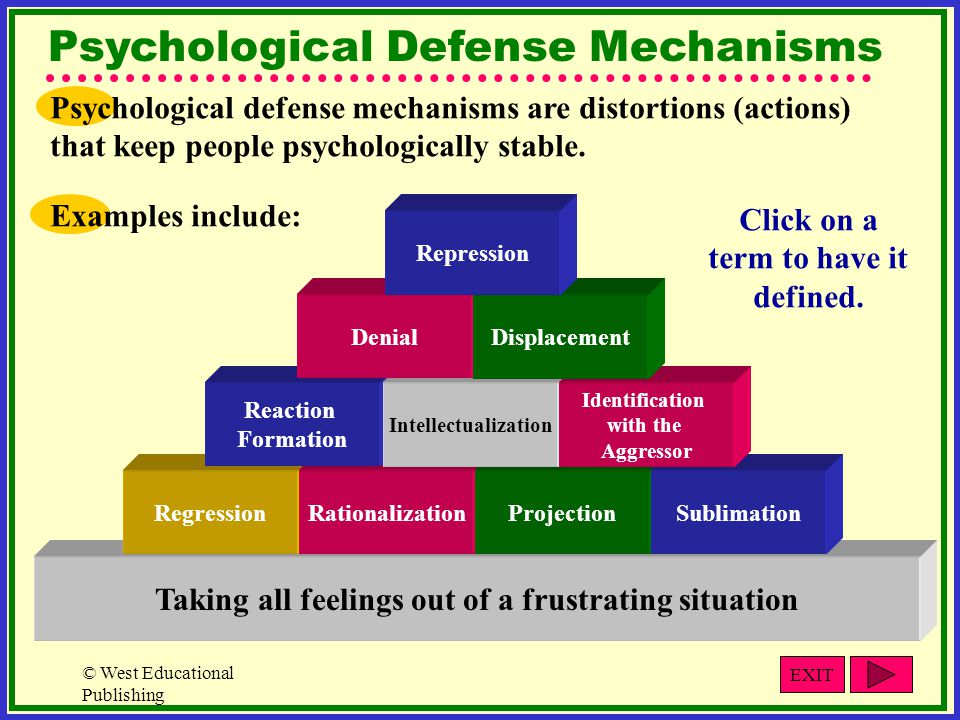 Do you really think so, or do you think you do? nine0003
Do you really think so, or do you think you do? nine0003
A lot of criticism of everything and everyone, the desire to teach other people to behave in a certain way. “You definitely need to find a bride and one, how much can you run back and forth?!” And if we turn to the need-motivational sphere of a person who imposes this on another, then it is not difficult to understand that the search for one and only is his dream and need. This happens automatically. The person who says this to another does not keep track of what he communicates about a personal need that is exclusively his. And does the person who is given such a recommendation need this very bride, it doesn’t matter at all, because the adviser sincerely believes that since I want it, then everyone else wants it too, how not to want something ?! nine0003
But seriously: when a person himself learns to clearly understand and realize what he needs, then he will be able to see the needs of other people, then there will be no desire to “catch up and do good”. When we appropriate unaccepted parts of ourselves, we understand that it is ourselves, then we can do something with it.
When we appropriate unaccepted parts of ourselves, we understand that it is ourselves, then we can do something with it.
Types of defense mechanism
It is very important to bring this into awareness mode. However, if you are even directly told that you "have it", then the emotions that you will have in connection with this will block any ways to contact with what you so stubbornly seek to run away from. nine0003
In this case we are talking about aggression as a way of defense. However, the person himself does not understand that he is defending himself from himself.
Psychologists distinguish 3 types of this psychological defense mechanism.
Mirror projection
Mirror projection - when a person finds traits, characteristics, features in another or his own idea of him, which he considers as his own, or would like to have.
For example, sincerely wanting to help, a partner in a couple conveys to another the vital need for personal psychological therapy, saying that he needs it and this is the key to all those doors that he stands in front of, not daring to enter. However, if we analyze the needs of the adviser himself, then most likely it will turn out that it is in psychological sessions that he finds a resource for himself, on which he can rely in his own forward movement. nine0003
However, if we analyze the needs of the adviser himself, then most likely it will turn out that it is in psychological sessions that he finds a resource for himself, on which he can rely in his own forward movement. nine0003
Projection of catharsis
Projection of catharsis - when the same thing happens that I described above, however, the person himself refuses these traits, does not recognize them as his own, does not want to have them.
For example, a condemnation of a neighbor in a communal apartment: sitting over a cup of coffee and discussing the situation when that same neighbor “gets into other people's business”. However, right now, the aunt, while “gobbling up” a cake and drinking a cup of coffee, is doing exactly what she condemns in another. Of course, this causes strong emotions, which is a marker that the situation concerns me personally. If it had not been affected in any way, then there would be no emotions, or they would not have such power. nine0003
Additional projection
Additional projection - if a person attributes some traits, characteristics or states to another person that justify his own state or behavior.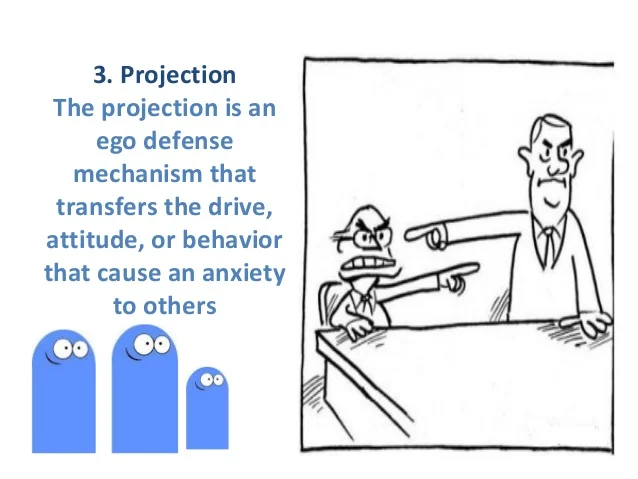
For example, you can give countless advice about the "correct" behavior of another person, but we remember the saying that "the road to hell is paved with good intentions." Or “Well, if not for his behavior, then I would be different!” says the wife. nine0003
It is very important to be aware of the personal line of responsibility, first of all, for one's own behavior and reactions. True, this is not always possible due to the fact that it is not realized and painful.
In fact, any projection is a rejected part of the personality that should be appropriated.
This is possible if the person himself is interested in building open and trusting relationships, when he feels safe and can open himself to others, knowing himself.
If you find signs of projection in yourself or in a partner who is significant to you, talk about it, discuss it, try it on for yourself, let's give the opportunity to assign to others what is part of them. nine0003
Do not put pressure on a person, reproach him for something if he is not yet ready to recognize some peculiarities in himself.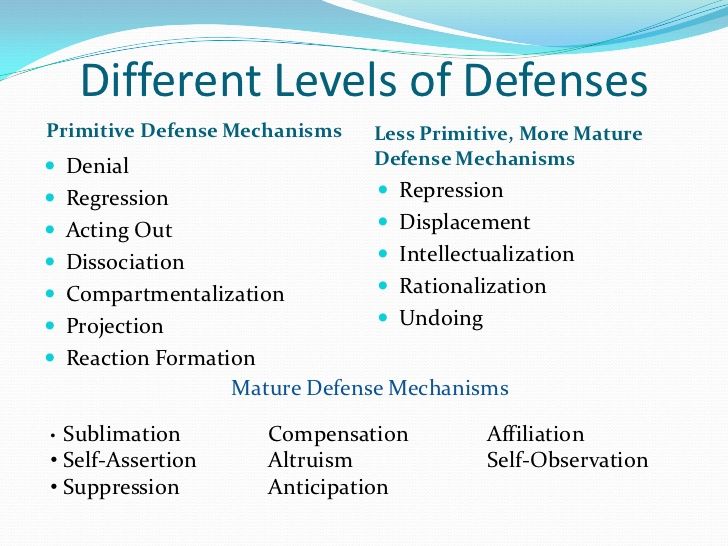 He may simply not be ready to be fully aware of the situation. When he sees and feels that you are not attacking him, but on the contrary, strive for contact with him, and not with his defense mechanisms, then this contact will take place. And right at this moment you will meet!
He may simply not be ready to be fully aware of the situation. When he sees and feels that you are not attacking him, but on the contrary, strive for contact with him, and not with his defense mechanisms, then this contact will take place. And right at this moment you will meet!
Someone is waiting for such a meeting all his life, living next to another person, and someone does not know that such a meeting is possible in principle! nine0003
Projection - Psychologos
Projection - (from Latin projectio - throwing forward) - a psychological mechanism, first considered by Z. Freud.
- In classical psychoanalysis, the process by which an individual's own traits, emotions, attitudes, etc., are attributed to someone else. Interruption of contact with the environment. This is accompanied by a denial that he himself has these feelings or tendencies. In speech, it looks like replacing the pronoun “I” with the pronoun “you” (or “they”, if we are talking about a whole group of people).
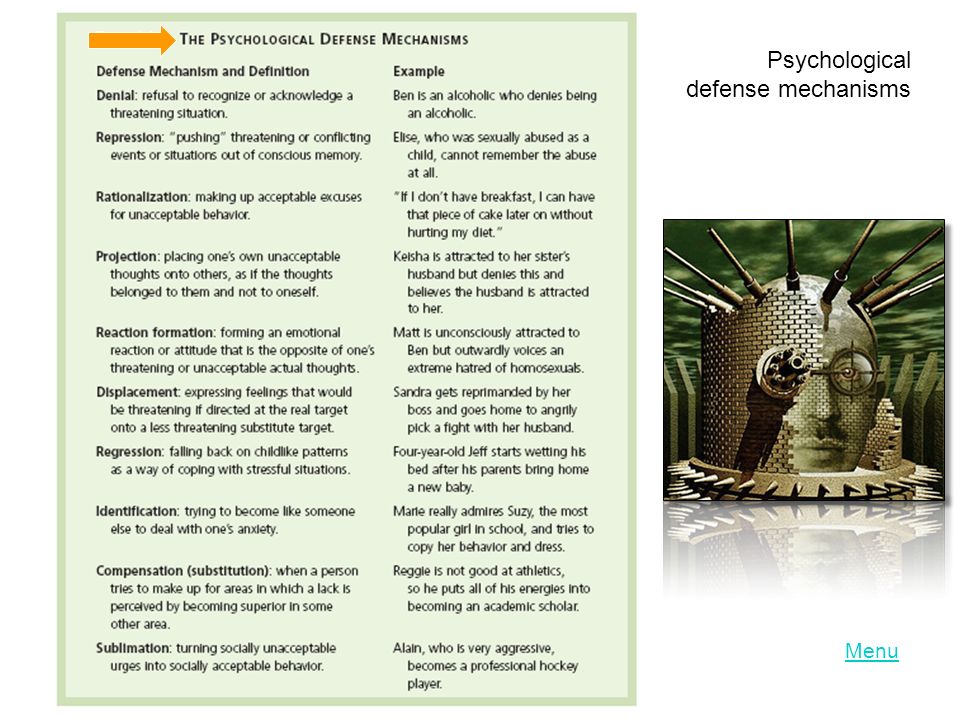 “They don't like me,” thinks the speaker, nervous before a public speech, “You're mad at me,” complains the one who is unable to recognize and accept his own aggression. The projection performs the functions of a defense mechanism, protecting the individual from anxiety, indicates the presence of some suppressed basic conflict; nine0106
“They don't like me,” thinks the speaker, nervous before a public speech, “You're mad at me,” complains the one who is unable to recognize and accept his own aggression. The projection performs the functions of a defense mechanism, protecting the individual from anxiety, indicates the presence of some suppressed basic conflict; nine0106 - In other psychodynamic theories, the process of involuntary attribution of the subjective processes of one person to others. This process is regarded as a normal process of mental development, not necessarily reflecting neurotic tendencies;
- Perception of environmental events and stimuli (especially ambiguous ones) in terms of one's own expectations, needs, desires, etc. This value is completely neutral with respect to the pathological aspect of projection and forms the basis for the use of projective techniques. nine0106
Projection (from Frederick Perls' Witness to Therapy)
The opposite of introjection is projection.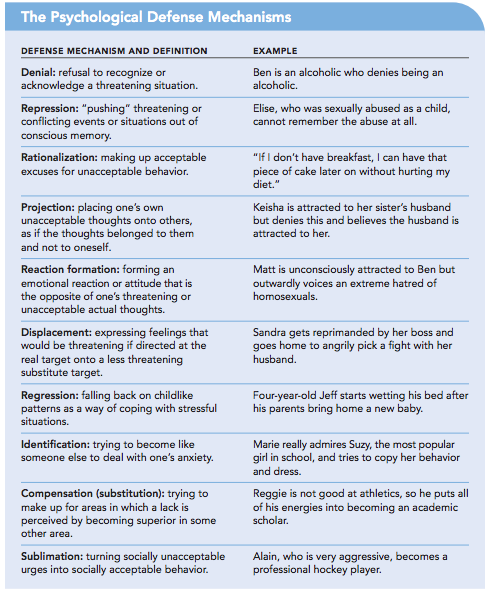 If introjection is the tendency to take responsibility for what is really part of the environment, then projection is the tendency to make the environment responsible for what comes from the person himself. An example of an extreme case of projection would be paranoia, clinically characterized by the presence of a well-organized delusional system in the patient. The paranoid usually turns out to be a highly aggressive person; unable to take responsibility for his own illusions, desires and feelings, the paranoid ascribes them to objects or people in his environment. His conviction that he is being persecuted is in fact a statement that he would like to be persecuted by others. But projection does not exist in such extreme forms; it is necessary to carefully distinguish between projection as a pathological process, and thinking through assumptions, which can be normal and healthy. Planning and anticipation, searching and maneuvering in chess and many other activities involve observing and making assumptions about the outside world.
If introjection is the tendency to take responsibility for what is really part of the environment, then projection is the tendency to make the environment responsible for what comes from the person himself. An example of an extreme case of projection would be paranoia, clinically characterized by the presence of a well-organized delusional system in the patient. The paranoid usually turns out to be a highly aggressive person; unable to take responsibility for his own illusions, desires and feelings, the paranoid ascribes them to objects or people in his environment. His conviction that he is being persecuted is in fact a statement that he would like to be persecuted by others. But projection does not exist in such extreme forms; it is necessary to carefully distinguish between projection as a pathological process, and thinking through assumptions, which can be normal and healthy. Planning and anticipation, searching and maneuvering in chess and many other activities involve observing and making assumptions about the outside world.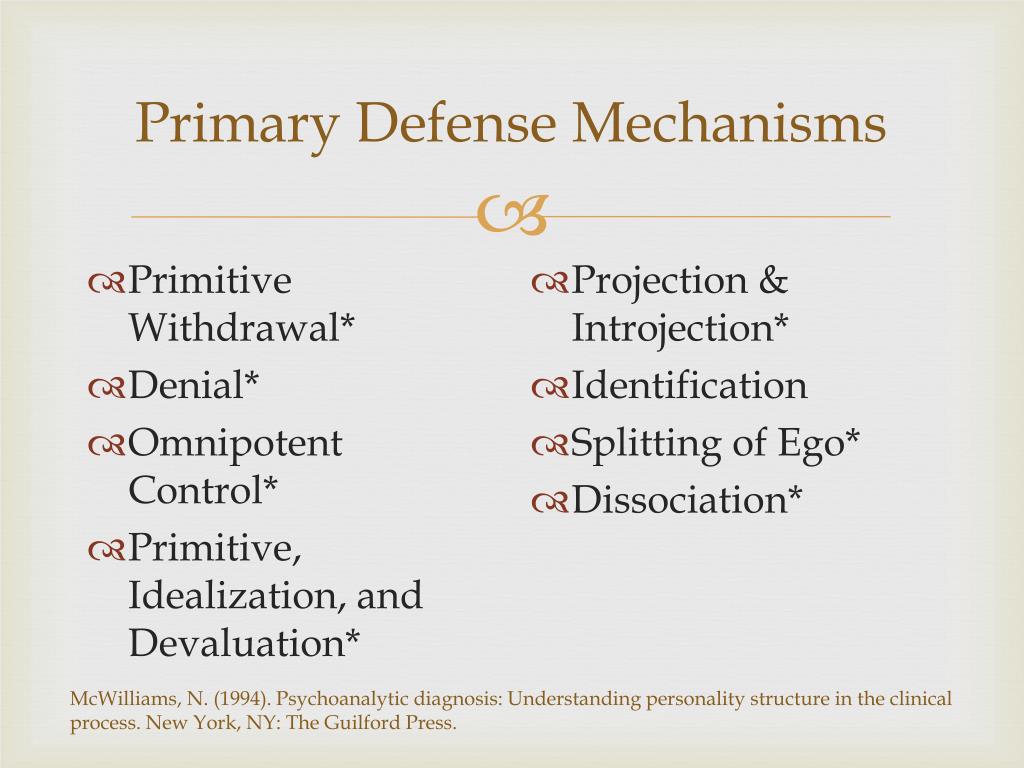 But these assumptions are understood as assumptions. When a chess player thinks several moves ahead, he makes a series of assumptions about his opponent's mental processes, as if to say, "If I were him, I would do such-and-such." But he realizes that he is making assumptions that will not necessarily be consistent with what guides his opponent's behavior, and he knows that these are his own assumptions. nine0003
But these assumptions are understood as assumptions. When a chess player thinks several moves ahead, he makes a series of assumptions about his opponent's mental processes, as if to say, "If I were him, I would do such-and-such." But he realizes that he is making assumptions that will not necessarily be consistent with what guides his opponent's behavior, and he knows that these are his own assumptions. nine0003
In contrast, a sexually inhibited woman who complains about being hit on by everyone, or a cold, aloof, arrogant man who accuses people of being hostile to him are examples of neurotic projection. In these cases, people make assumptions based on their own fantasy, not realizing that these are only assumptions. Moreover, they are unaware of the origin of their own assumptions.
Artistic creativity also requires some assumptions and projections. The writer often literally projects himself into his characters, becomes them while he writes about them. But, unlike the projecting neurotic, he does not lose ideas about himself.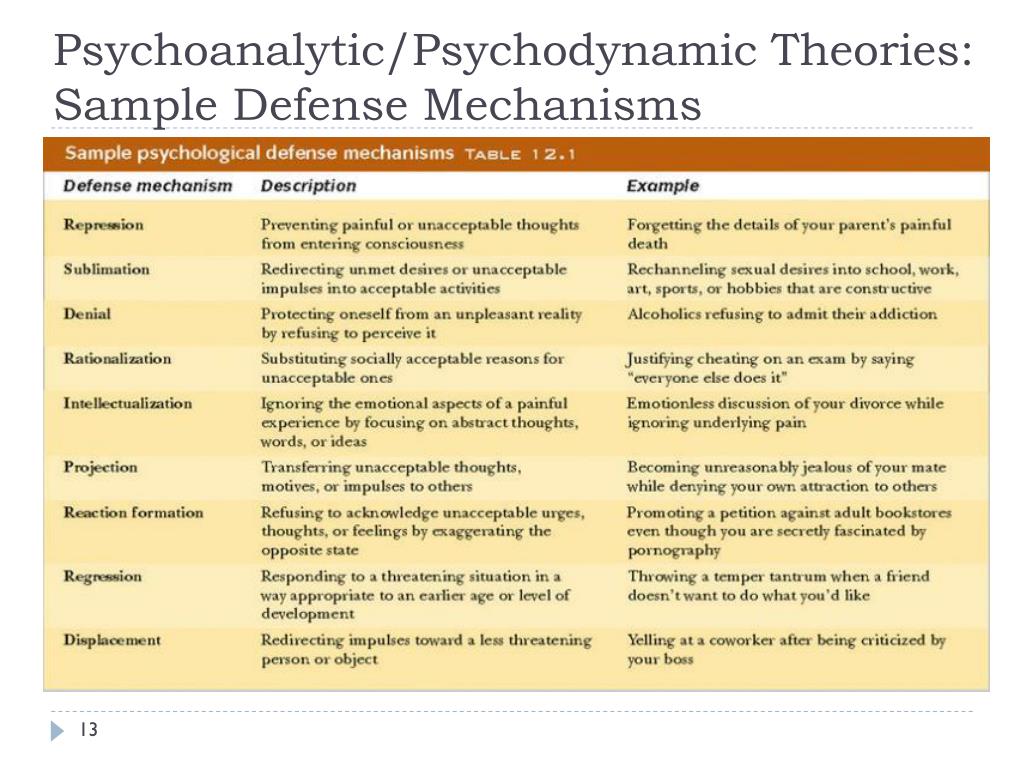 He knows where he himself ends and his characters begin, even if in the process of creation itself he loses his sense of boundaries and becomes someone else. nine0003
He knows where he himself ends and his characters begin, even if in the process of creation itself he loses his sense of boundaries and becomes someone else. nine0003
The neurotic uses the mechanism of projection not only in relation to the external world; he also uses it in relation to himself. He alienates from himself not only his own impulses, but also the parts of himself in which these impulses arise. He endows them with an objective, so to speak, existence, which can make them responsible for his difficulties and help him ignore the fact that they are parts of himself. Instead of an active attitude to the events of his own life, the projecting subject becomes a passive object, a victim of circumstances. nine0003
When a chorister complains about his bladder causing him trouble, this is a perfect example of projection. Here the ugly “it” raises its head, and our hero is almost a victim of his own bladder. “It just happens to me; I have to endure it,” he says. We are witnessing the emergence of a small fragment of paranoia. Just as an introjector might be asked who is speaking and the answer is "they," so the projector should be reminded, "It's your own bladder, it's you who needs to urinate." - When a projector says "it" or "they", he usually means "I". nine0003
Just as an introjector might be asked who is speaking and the answer is "they," so the projector should be reminded, "It's your own bladder, it's you who needs to urinate." - When a projector says "it" or "they", he usually means "I". nine0003
Thus, in the projection, we shift the boundary between ourselves and the rest of the world a little “in our favor”, which gives us the opportunity to relieve ourselves of responsibility, denying that we own those aspects of the personality that we find it difficult to reconcile with, which seem unattractive or offensive to us .
Also, projection is usually the result of our introjects causing us to feel alienated and self-contemptuous. Because our chorister has introjected the notion that good manners are more important than the satisfaction of pressing personal needs, since he has introjected the conviction that one should "bear it all smiling," he is forced to project or even expel from himself those impulses that are contrary to his external activities.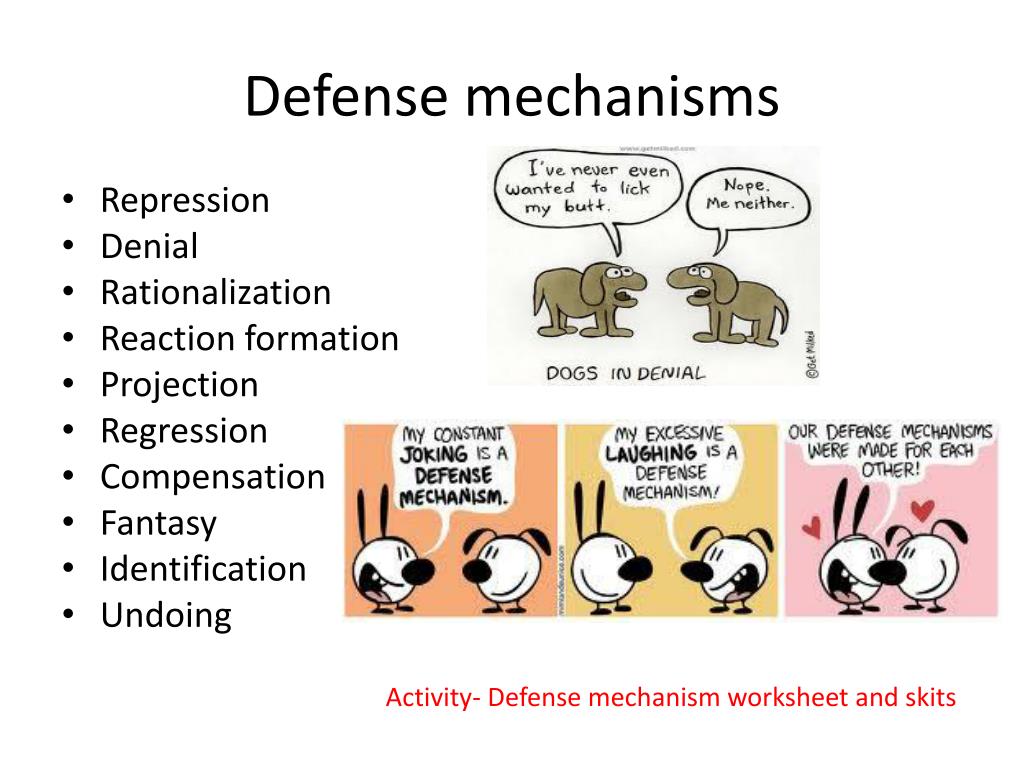 It is not he who feels the need to urinate; he's a good boy, he wants to stay with the band and keep singing. Urination is demanded by this nasty, naughty bladder, which, as luck would have it, ended up in him, which he considers to be an "introject" - an alien element, forcibly introduced into him against his will. nine0003
It is not he who feels the need to urinate; he's a good boy, he wants to stay with the band and keep singing. Urination is demanded by this nasty, naughty bladder, which, as luck would have it, ended up in him, which he considers to be an "introject" - an alien element, forcibly introduced into him against his will. nine0003
The projecting neurotic, like the introjector, is unable to distinguish between the facets of his own integral personality that really belong to him and that which is imposed on him from outside. He regards his introjects as himself, and he regards those parts of himself that he would like to get rid of as undigested and inedible introjects. Through projection, he hopes to free himself from imaginary "introjects" that are in reality not introjects at all, but aspects of himself. The introjecting personality, which is a battlefield between warring unassimilated ideas, gets a parallel in the form of a projecting personality, which makes the world the arena of the battle of its personal conflicts.